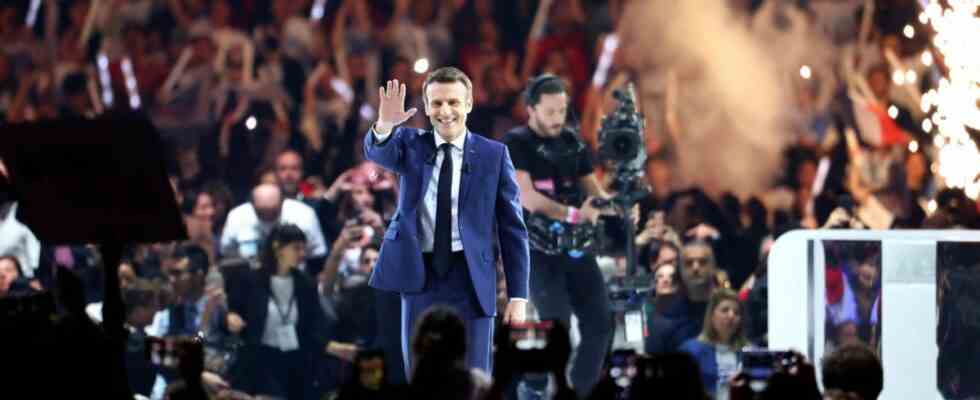In advance, Emmanuel Macron’s campaign team had already uploaded a kind of trailer for his appearance on YouTube. In the video series Le candidatefor which Macron is accompanied in the election campaign, one sees the French President strutting through the empty arena. He explains to the team how he envisions the video screens, announces that he has something more sporty and sensual in mind than a classic election campaign event and personally checks the music selection (“That’s the perfect opening music. […] And at the end the Marseillaise”). The boss, that’s what the whole thing suggests, is now taking matters into his own hands.
There’s a lot at stake this Saturday at the Paris La Défense Arena. Macron invited to his first and last big appearance before the first ballot. The hall near Paris is one of the largest in Europe, with space for around 40,000 people. The superlative event stands in contrast to Macron’s election campaign, which has been rather frugal to date: For a long time, the president seemed to be counting on the bonus of his office, staging himself as a crisis manager and international negotiator in the Ukraine war. He only made his candidacy official at the beginning of March, announcing his program at a sober press conference. Macron left the meetings, as the big election campaign events with fan T-shirts and applause are called in France, to his opponents – until now.
Because now Macron is going for the full program: like in a boxing match, the stage is placed in the middle of the hall. In order to fill up the arena, Macron’s team had even launched a kind of competition in advance: the 400 people who acquired the most competitors were promised rewards, for example an aperitif at the campaign team’s headquarters. Shirts in the audience read “Emmanuel Macron avec vous” (“Emmanuel Macron with you”), the official slogan of his campaign. After three flashback videos, several Laola waves and a 15-second countdown, the candidate fights his way through the crowd like a pop star, up onto the stage. His speech will last more than two hours.
Macron promises a purchasing power premium of up to 6,000 euros
It seems a bit as if Macron wants to use this appearance to counter all those who accuse him of having neglected the election campaign and domestic political debates too much so far. “We’re doing everything we can to end the war in Ukraine,” he said briefly at the beginning of his speech. But then he quickly turns to the favorite topic of French voters, purchasing power. The work must pay off more again, says Macron. Again and again he speaks of injustices, for example it cannot be that French people who work have to spend all their salary on petrol or rent.
A whole series of socio-political promises follows: his government has already invested 20 billion euros in offsetting the high energy costs, and employees should be able to receive a tax-free purchasing power bonus of up to 6,000 euros from the summer. The minimum pension for a full working life should be 1100 euros in the future. Macron also promises to increase support for single parents and hire 50,000 additional caregivers.
His liberal line still shines through: “There is no magic money,” says Macron. A welfare state cannot exist without a productive state, “we have to work more.” Referring to his main competitors, the far left Jean-Luc Mélenchon and the far right Marine Le Pen, he says it’s wrong to believe those who promise retirement ages of 60 or 62. Instead, the retirement age should be raised to 65.
His lead has recently dwindled
It is remarkable how long and extensively Macron devotes himself to domestic political issues during this appearance. Every now and then he touches on the war in Ukraine, he only gets to talk about his heart’s subject Europe at the end of his speech, crises such as the war or the corona pandemic have shown how important a common European path is.
The thematic change of course seems absolutely necessary a few days before the first ballot. After Macron led the polls for a long time, his lead has dwindled in recent days. Should the incumbent – which is relatively likely – run against Le Pen in the run-off election, things could get closer than expected. In recent polls, Macron is about seven percentage points ahead of the far-right candidate. Macron’s strategy of focusing on the war in Ukraine instead of the election campaign doesn’t seem to have really worked. Le Pen, on the other hand, campaigned quietly but persistently. She was less provocative than five years ago, presented herself as moderate and made purchasing power the focus of her campaign.
The stronger Le Pen becomes, the stronger Macron’s need to set itself apart from its competitors seems to be. Macron had already spoken last week of a “tandem” between the right-wing extremist Éric Zemmour and Le Pen, and during his appearance this weekend he warned of the “right-wing extremist danger” – albeit without naming any specific names. In the meantime, people have gotten used to the fact that anti-Semitic and racist actors are sitting in the television studios. “Don’t boo them,” he calls out to the crowd in the hall, “hit them with ideas, with respect.” The elections on April 10th and 24th are also between progress and retreat, between patriotism and nationalism. “Vive la République, vive la France,” he roars to the crowd at the end. Then a chorus of T-shirt wearers comes on stage and sings – the Marseillaise.

